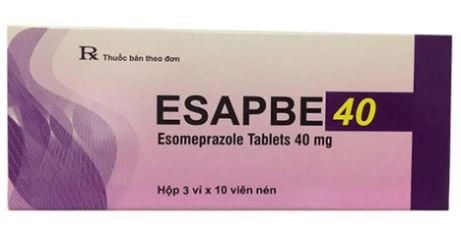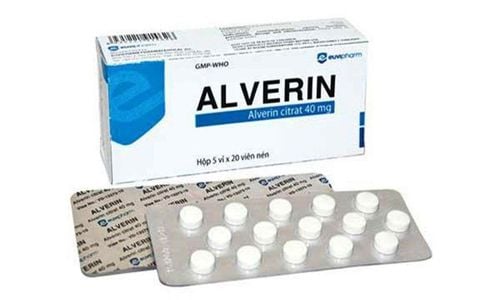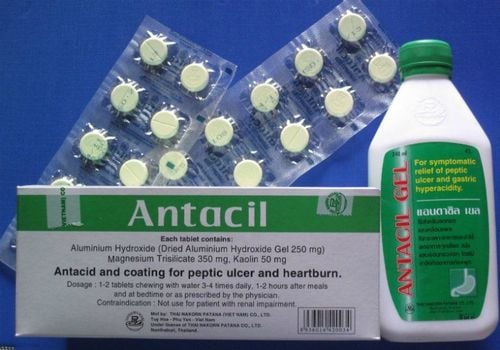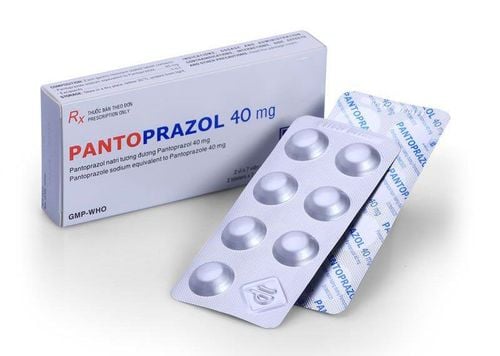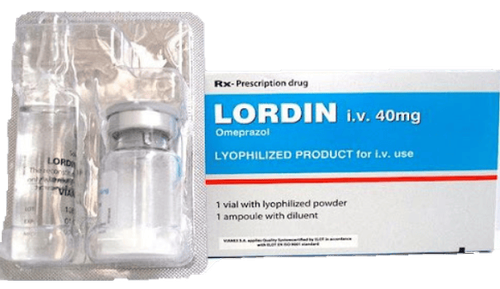This is an automatically translated article.
Vinxium drug containing the active ingredient Esomeprazole is indicated in the treatment of gastroesophageal reflux disease, prevention and treatment of gastric ulcers caused by NSAIDs... Let's learn about the uses, usage and notes when Use the drug Vinxium through the article below.
1. Uses of the drug Vinxium
Vinxium contains the active ingredient Esomeprazole 40mg - an inhibitor of gastric acid secretion through the mechanism of inhibiting the proton pump H + / K + - ATPase in gastric parietal cells. Vinxium is prepared in the form of lyophilized powder for injection and is indicated as an alternative treatment when oral administration is not suitable in the following diseases:Gastro-oesophageal reflux in patients with esophagitis or have symptoms of severe gastro-oesophageal reflux; Prevention and treatment of gastric and duodenal ulcers caused by the use of NSAIDs. 2. Dosage of Vinxium 40 Vinxium is prepared in the form of lyophilized powder for injection for injection or infusion according to the following principles:
Injection route:
The solution for injection is prepared by adding 5ml of NaCl solution 0. 9% intravenously into the vial containing Esomeprazole powder. The solution after preparation is colorless, transparent or light yellow; Vinxium solution after reconstitution is used intravenously for at least 3 minutes; Reconstituted drug solution must not be mixed or shared with other drugs; The reconstituted injection should be used within 12 hours (preferably immediately after reconstitution to ensure sterility); If the required dose is 20mg, only half the volume of the reconstituted solution should be used, the excess solution should be discarded. Infusion route:
Vinxium solution for infusion is prepared by adding 0.9% NaCl solution to the vial containing Esomeprazole powder until it reaches 100ml of solution; The drug solution after preparation is colorless, transparent or light yellow (visual inspection to detect foreign molecules and color change before use); Vinxium drug solution, after being mixed, is used for intravenous infusion in about 10-30 minutes; The reconstituted infusion should be used within 12 hours (preferably immediately after reconstitution to ensure sterility); If the required dose is 20mg, only half the volume of the reconstituted solution should be used, the excess solution should be discarded. The recommended dose of Vinxium is as follows:
Treatment of severe gastroesophageal reflux disease: Use Vinxium 40 mg/time/day; Treatment of reflux esophagitis without inflammation: Use 20mg / time / day. Patients with hepatic impairment: Mild to moderate hepatic impairment does not require dose adjustment. In case of severe liver failure, the dose of Vinxium 20mg/day should be reminded. Treatment of severe peptic ulcer disease in patients with severe liver failure, intravenous injection of 80mg Vinxium within 30 minutes, then intravenous infusion of 4mg/hour continuously for 72 hours.
3. Side effects of drugs
Vinxium 40 may cause some side effects as follows:
Common: Dizziness, headache, skin rash, constipation, diarrhea, nausea, vomiting, dry mouth and indigestion; Uncommon: Insomnia, fatigue, somnolence, itching, rash, visual disturbances; Rare: Fever, profuse sweating, hypersensitivity reactions, confusion, depression, hallucinations, agitation, leukopenia and thrombocytopenia; jaundice, hepatitis, increased liver enzymes, liver dysfunction; taste disturbance, arthralgia, interstitial nephritis, myalgia, Stevens-Johnson syndrome, skin toxicity, epidermal necrolysis, bullous rash; increased risk of gastrointestinal infections. 4. Notes when using Vinxium 40mg is contraindicated to use Vinxium 40mg in the following cases:
The patient is sensitive to any component of Vinxium 40; Patients who are being treated with protease inhibitor antiviral drugs such as Nelfinavir, Atazanavir, Saquinavir... Note when using:
Vinxium drug may mask, affect the process of definite diagnosis of cancer, so It is necessary to exclude the possibility of gastric cancer before treatment. Caution should be exercised during prolonged treatment with Esomeprazole because of the potential risk of atrophic gastritis. The efficacy and safety of Vinxium in the treatment of children under 18 years of age have not been established, so caution should be exercised when using the drug in these subjects. For patients with gastroesophageal reflux disease, it is recommended to combine treatment with drugs and a scientific and reasonable diet. Pregnant women: There are currently no studies proving the safety of Esomeprazole for pregnant women, so it should only be used in the treatment of these subjects when absolutely necessary and indicated. of the treating physician. Lactation: There are currently no studies demonstrating the ability of Esomeprazole to be excreted in human milk, so patients should discontinue breast-feeding during treatment with Vinxium.
5. Drug interactions
Vinxium drugs can cause some interactions as follows:
Vinxium reduces the absorption of some drugs from the gastrointestinal tract such as digoxin, ketoconazole, iron salts... due to proton pump inhibition, which changes pH in the stomach thick; Drugs Amoxicillin , Clarithromycin increase the concentration of Esomeprazole in the blood plasma, leading to an increased risk of experiencing side effects; Vinxium reduces the bioavailability of drugs metabolized by cytochrome P450 enzymes or isoenzyme CYP2C19; Vinxium increases methotrexate concentrations when used concurrently. In summary, Vinxium is indicated in the treatment of gastroesophageal reflux disease, prevention and treatment of gastric ulcers caused by NSAIDs... To use the drug safely and effectively, patients need to use it strictly. directed by Doctor.
Please dial HOTLINE for more information or register for an appointment HERE. Download MyVinmec app to make appointments faster and to manage your bookings easily.




